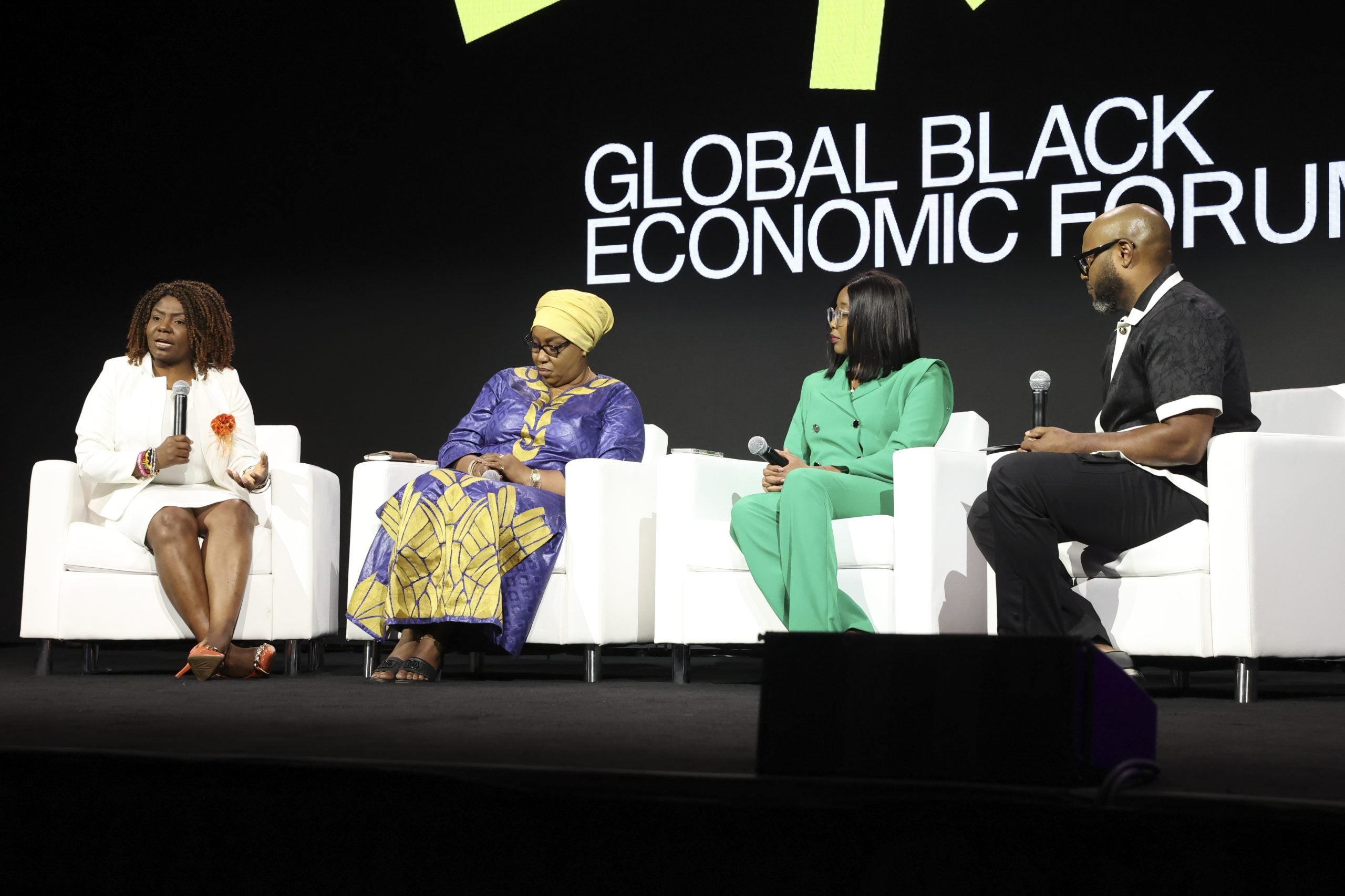
Three powerhouse global leaders took to the stage at the 2024 ESSENCE Festival Of Culture to share their insights on defining the Black Diaspora and building economic power. Francia Márquez-Mina, the first Black Vice President of Colombia, Emma Theofelus, the Minister of Information and Communication Technology of Namibia and Oley Dibba-Wadda, the CEO of the Forum for African Women Educationalists, captivated the audience with their compelling discussion on these critical issues.
“If we want to go fast, go alone; if you want to go far, go together,” said moderator Dr. Nii-Quartelai Quartey before steering the conversation to Black global leadership and how it can shape the international economic landscape.
The panel discussed topics such as protecting Black businesses in the global market, bridging the gap between the diaspora, and environmental injustice.
“Many systems are allowing for many citizens to have financial literacy to be able to hold bank accounts and to be able to transact online, but not many know how to protect themselves online… Small businesses and micro businesses are able to protect the dollars that they have as they reach more markets outside of their countries, outside the African region and in the world, because, of course, through technology, we are all one global village,” said Theofelus.

Márquez-Mina emphasized why having Black women in positions of power is vital to unite the diaspora across cultures and ethnicities. “Specifically, women must be present in political spheres. Black women must be present in decision-making spaces at the global level. I am the first Vice President of African descent in Columbia; I hope I won’t be the last. The fact that I am blazing this trail will allow other women like me to have access to such positions of power in the future,” she said.
Another major topic Márquez-Mina, spoke about was climate change’s impact on Black communities. Recently, there has been more attention on how climate change has negatively affected Black people’s ability to have healthy lives and cultural legacy.
“This is a matter of racial justice; today worldwide, many things are being discussed, such as fundamental aspects of the future of humanity regarding climate change and whether we choose paths of peace or paths of war in our conflict,” said Márquez-Mina. “We must be there, our voices must be heard in those spaces…Black people and people of African descent throughout the world are suffering disproportionately with the consequences of climate change.”
In Louisiana, Black communities have faced significant environmental challenges due to the activities of oil and gas companies. St. John the Baptist Parish, infamously known as “Cancer Alley,” has made national headlines for its devastating health impacts on its predominantly Black population. According to Pro Publica, residents of Cancer Alley are exposed to some of the highest levels of air pollution in the United States, resulting in elevated cancer rates and other serious health conditions.
Similarly, the continent of Africa has long been exploited for its natural resources, leading to severe environmental and social repercussions. In the Democratic Republic of Congo, the cobalt mining industry has drawn significant attention due to its hazardous working conditions and environmental degradation. Amnesty International has highlighted how cobalt mining contributes to food insecurity and poses a global human rights issue. Social media platforms have played a crucial role in raising awareness about these issues, with viral hashtags, images, and videos spreading information rapidly across the diaspora community.
This heightened awareness of environmental racism has allowed individuals within the diaspora to recognize the commonalities in the struggles they face and advocate against. Despite the progress made in raising awareness, all the panelists agreed that much work is still needed to strengthen the network between Africa and Black communities globally. They emphasized the need for continued collaboration and advocacy to address these pressing environmental and social justice issues.
“I believe the future of people of African descent will necessarily go through recognizing and knowing each other better at the global level,” said Marquez-Mina. “It will have to go through weaving partnerships and alliances so that we can all hear each other’s voices among the diaspora worldwide through music, film, and also through science and technology,” she said
“I say no matter where you come from, as long as you’re Black, you are African,” said Dibba-Wadda. “These invisible boundaries need to be dismantled. We need to be able to communicate based on our colors; we need to stop asking where we come from and who we are. While we can live in isolation we need to start having discussions together with ourselves and start engaging with ourselves…We cannot be having conversations in systems that were developed to oppress us,” she said.
Theofelus agreed and expressed her disappointment regarding the lack of effective multilateralism among the diaspora. She emphasized that the fragmented approach to addressing the shared challenges faced by Black communities globally hinders collective progress. Theofelus pointed out that centering the conversation solely on the intersectionality of Black identity, while important, can inadvertently create divisions rather than unity. She argued that a more cohesive and collaborative multilateral approach is essential for tackling the complex issues of environmental racism, economic disenfranchisement, and social injustice that affect the diaspora.
Theofelus says that by fostering stronger connections and cooperation among Black communities worldwide, the diaspora can better leverage its collective power to drive meaningful change and build economic power. “As we people of African descent, those that live on the continent and those that left the continent centuries ago and live in other parts of the world, we need to come together, and we need to know more about each other…Africa is what unites all of us. The color of our skin brings us together, so we must be intentional about knowing each other,” said Theofelus.







